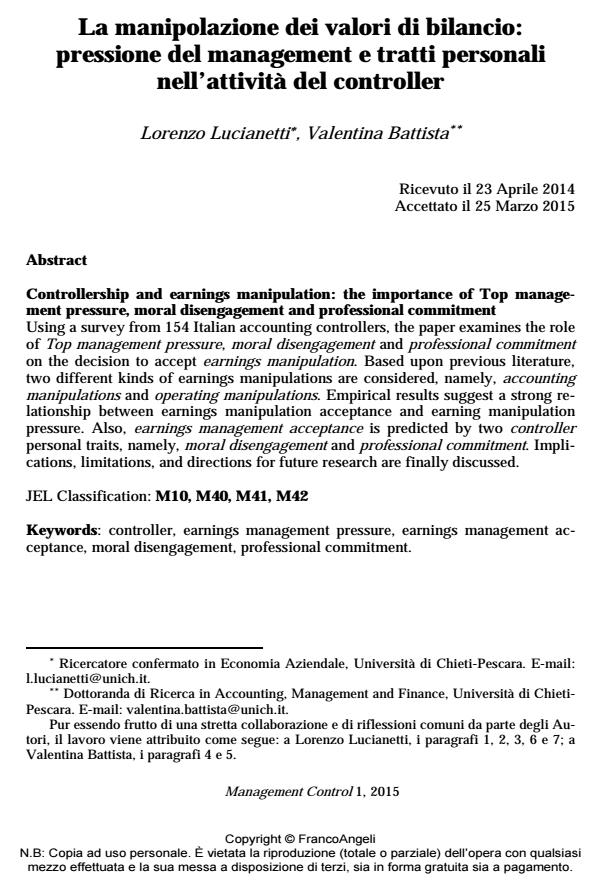La manipolazione dei valori di bilancio: pressione del management e tratti personali nell’attività del controller
Titolo Rivista MANAGEMENT CONTROL
Autori/Curatori Lorenzo Lucianetti, Valentina Battista
Anno di pubblicazione 2015 Fascicolo 2015/1
Lingua Italiano Numero pagine 32 P. 101-132 Dimensione file 178 KB
DOI 10.3280/MACO2015-001005
Il DOI è il codice a barre della proprietà intellettuale: per saperne di più
clicca qui
Qui sotto puoi vedere in anteprima la prima pagina di questo articolo.
Se questo articolo ti interessa, lo puoi acquistare (e scaricare in formato pdf) seguendo le facili indicazioni per acquistare il download credit. Acquista Download Credits per scaricare questo Articolo in formato PDF

FrancoAngeli è membro della Publishers International Linking Association, Inc (PILA), associazione indipendente e non profit per facilitare (attraverso i servizi tecnologici implementati da CrossRef.org) l’accesso degli studiosi ai contenuti digitali nelle pubblicazioni professionali e scientifiche.
Using a survey from 154 Italian accounting controllers, the paper examines the role of Top management pressure, moral disengagement and professional commitment on the decision to accept earnings manipulation. Based upon previous literature, two different kinds of earnings manipulations are considered, namely, accounting manipulations and operating manipulations. Empirical results suggest a strong relationship between earnings manipulation acceptance and earning manipulation pressure. Also, earnings management acceptance is predicted by two controller personal traits, namely, moral disengagement and professional commitment. Implications, limitations, and directions for future research are finally discussed.
Parole chiave:Controller, earnings management pressure, earnings management acceptance, moral disengagement, professional commitment.
Jel codes:M10, M40, M41, M42
- Expected credit losses and managerial discretion. Current practices and future challenges Riccardo Macchioni, Alessandra Allini, Martina Prisco, in MANAGEMENT CONTROL 3/2021 pp.111
DOI: 10.3280/MACO2021-003006 - Esiste una strategia di Internal Auditing che crea valore? Un'analisi empirica del contesto italiano Giuseppe D'Onza, Alessandra Rigolini, Francesco Brotini, in MANAGEMENT CONTROL 1/2016 pp.125
DOI: 10.3280/MACO2016-001008 - L'origine accademica condiziona le pratiche di earnings management? Un'analisi sugli spin-off universitari Antonio Prencipe, in MANAGEMENT CONTROL 2/2025 pp.205
DOI: 10.3280/MACO2025-002010 - The performativity of Accounting Information System in interfirm relationships Carmela Rizza, Daniela Ruggeri, in MANAGEMENT CONTROL 1/2016 pp.71
DOI: 10.3280/MACO2016-001005 - La valutazione del CdA in contesti ad elevata concentrazione proprietaria: mero conformismo o reale strumento di valutazione? Romilda Mazzotta, Giovanni Bronzetti, Graziella Sicoli, Paolo Tenuta, in MANAGEMENT CONTROL 2/2018 pp.107
DOI: 10.3280/MACO2018-002006 - Regulatory compliance of financial control systems and its implications for accountants. Some evidence from Italian experience katia Corsi, Daniela Mancini, in MANAGEMENT CONTROL 3/2015 pp.65
DOI: 10.3280/MACO2015-003005 - Crisi delle PMI e strumenti di warning. Un test di verifica nel settore manifatturiero Mauro Paoloni, Massimiliano Celli, in MANAGEMENT CONTROL 2/2018 pp.85
DOI: 10.3280/MACO2018-002005 - Big Data e revisione contabile: uno studio esplorativo nel contesto italiano Federica De Santis, in MANAGEMENT CONTROL 2/2018 pp.129
DOI: 10.3280/MACO2018-002007
Lorenzo Lucianetti, Valentina Battista, La manipolazione dei valori di bilancio: pressione del management e tratti personali nell’attività del controller in "MANAGEMENT CONTROL" 1/2015, pp 101-132, DOI: 10.3280/MACO2015-001005